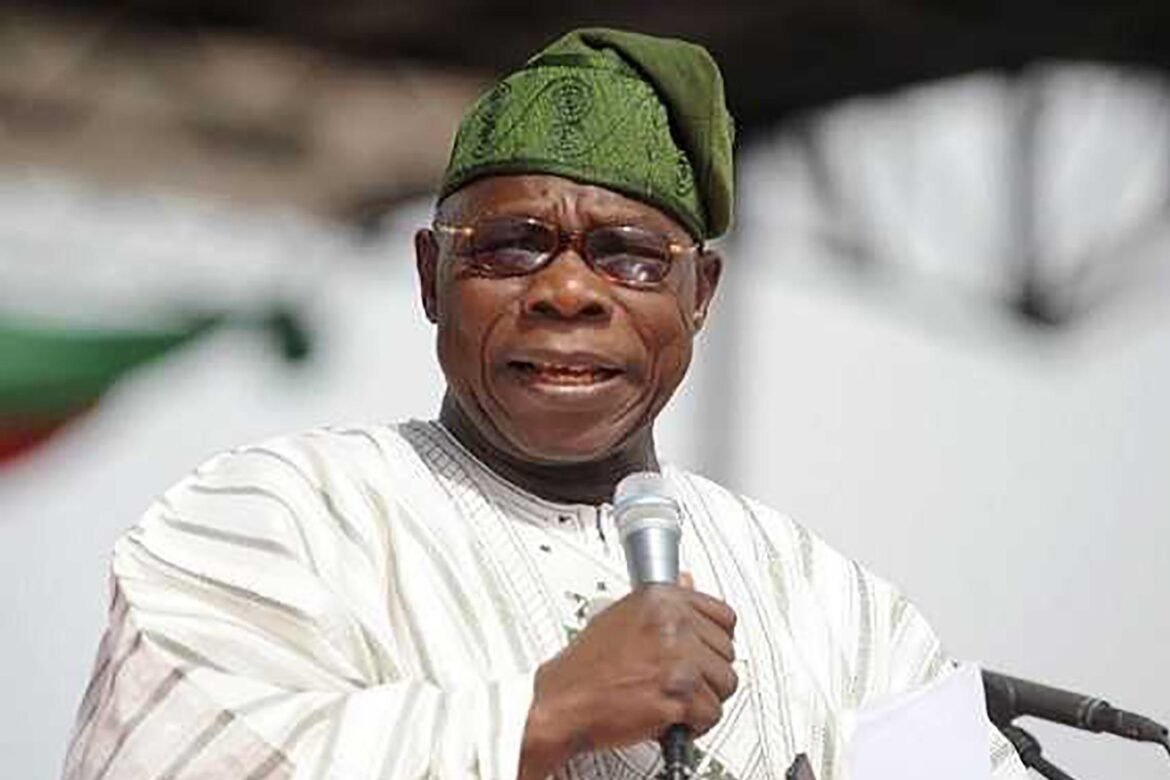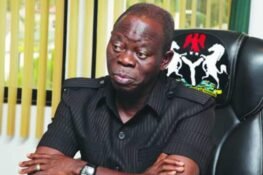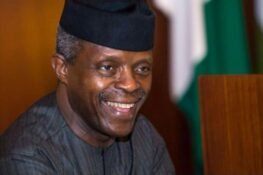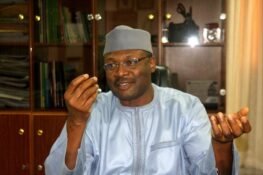Age has nothing to do with being a good president and the argument made by former President Olusegun Obasanjo in his New Year Day missive to Nigerians on the type of President they should elect next month is flawed and warped.
President Obasanjo told the Nigerian youth the most critical factor in deciding who to vote for as Nigeria’s next president is age.
By the same logic, I wonder if President Obasanjo is not too old at 85 official years to tell young people what the important criteria should be.
There is an abundance of evidence from the clergy to community, traditional leadership to politics to prove that age is not preclusive to good leadership.
Before I venture, it is important to make it abundantly clear that I have no horse in the 2023 race, and is extremely disturbed that many Nigerians are far too lost in the ethnic and emotional odyssey that comes with every national election.
I have no appreciation for the quality of the presidential candidates by the 18 political parties for the highest office in the land.
The parties presented us with recycled materials, violators of the law, habitual liars, those who have too little record of performance or candidates who cannot even charm a dog.
Nigeria is heading for another journey through the maze and will come back trying to start the puzzle again in 2027.
Back to the former President.
There are so many claims in the letter, “My appeal to all Nigerians, particularly young Nigerians,” to disagree with, but I will stay within his conclusion that age is the predeterminant for Nigeria’s next president.
While he did not clearly state at what age a person becomes too old to be elected, he pre-selected someone at the age of 60, likening it to the age at which he became a two-time head of state.
Wrote he: “I became Head of State at 39 and at 42, I had retired into the farm.
When it was considered necessary, I was drafted back into active political life after twenty years of interregnum.
I came back at 62 and by 70, I was on my way out. Others like General Gowon and Enahoro became national leaders at 33 and 27 respectively and General Gowon at the helms of leadership of Nigeria at the highest level.”
The former president boldly claimed: “The vigour, energy, agility, dynamism and outreach that the job of leadership of Nigeria requires at the very top may not be provided as a septuagenarian or older. I know that from personal experience.”
As Obasanjo (or his writers) were putting pen in the ink, Brazil was installing Luiz Inácio Lula da Silva as its president, after kicking a younger man out at the age of 77
Without presenting medical evidence of invalidity, he made claims that are questionable and reckless, to say the least.
The general went too far in order to make his case.
Leadership, vision and ability have never had anything to do with age.
What he preached is discrimination based on age or physical ability, the very things that modern societies are trying to flush.
As Obasanjo (or his writers) were putting pen in the ink, Brazil was installing Luiz Inácio Lula da Silva as its president, after kicking a younger man out at the age of 77.
His predecessor, Jair Bolsonaro, who had a disastrous term, is 10 years younger.
Lula returns to power for the third time with little formal education.
Current US President, Joe Biden, was inaugurated at 78 years and, from all indications, will vie again for the office. When Biden was a younger man, he had contested and lost. He wasn’t given a nod by the American people until he was ripe in age.
While contesting, the Donald Trump political machine stopped at nothing to make Biden look like a man about to die, even though Trump became a president at 70 and is running again.
Ronald Reagan became US president at the age of 69 and had two terms in office.
In all, there are a total of seven presidents in America who got the first term above 64 years. Even more interesting is the case of Franklin Delano Roosevelt, who was paralyzed from the waist down. He was disabled, won elections and died in office. Regardless, he is persistently ranked by historians as one of the best presidents in American history.
One of the greatest Israeli Prime Ministers, Shimon Peres, served until he was 90 years old while Mahathir Mohamad resigned as Prime Minister of Malaysia past the age of 94.
We could go on counting successful leaders of nations who served at an older age, even without considering dictators and monarchs.
So, being old or even disabled is not, by any available evidence, an impediment to performance in office.
In the same manner, being young should not be seen as an issue – as long as the person is within the constitutional threshold and brings something to the table.
Among the youngest presidents and prime ministers in the world today are Gabriel Boric, President of Chile, who is 36, Dritan Abazović, Prime Minister of Montenegro and Sanna Marin, Prime Minister of Finland, both of whom are 37.
The Nigerian constitution already took care of the letter General Obasanjo did not need to write.
All you have to be is 35 years to infinity, and you are considered good enough if you belong to a registered political party, are a Nigerian by birth and are certified to have an education equivalent to School Certificate. Millions of Nigerians are qualified to be president.
General Obasanjo is not a democrat when he introduces an illegal theory of invalidity just because he has a preferred candidate.
If he wishes to endorse any candidate, he is entirely free to do so, without supporting his decision with unconstitutional logic.
It is also ridiculous for President Obasanjo to talk about his colleagues and himself becoming leaders at the age of 27 or thereabout.
Obasanjo goes back to an age when anyone could become a head of state just by wearing a military uniform. He is so ancient. It is no longer possible, even in the military, for anyone to have such a luck.
No one will be accepted as leader in a more sophisticated Nigeria with no ideas about how to run a household, talk less a nation.
His postulations are mundane and archaic. If General Obasanjo is really serious about youth, he ought to look for someone on the #EndSARS team.
But General Obasanjo has endorsed someone he prefers. Fine.
I don’t have anything for or against his endorsee, but he is flat wrong to use invalid logic to rob young people of history and truth.
What Nigeria needs is neither an old or young president but an able, visionary, intelligent, experienced and effective president.
Nigerian does not need a president who can be manipulated and controlled by the General or who “has people who can pull his ears, if and when necessary.”
No! Nigeria, with its complex problems, can no longer be run as a conglomerate of the mafia.
The Nigerian youth do not need the old guard sitting in Ota, Katsina or Minna telling their elected leader what to do.
That is the old order.
The next president must be detached from the old order and must be sharp, bright and convinced about the office and what it will take to get Nigerians to the promised land.
There has to be an individualistic approach in the next presidency, since the consultation method has failed woefully.
It must be a pact with the people alone.
The next president must be free to select those who can best serve, not on the basis of consultation or national character but merit and competence.
The job of a president is for someone who will create and manage policies fit for a world in which the youths will have a different experience.
The presidency will require new skills, a refined vision and the ability to carry the people along. Those are the things that President Mohammadu Buhari did not do well – nobody understood his vision and he failed to carry anyone along.
Here are the questions that the young people need to ask in order to find the ideal president.
Does the candidate understand you and your daily challenges?
Has he demonstrated anything to convince you he knows where you are, other than mere talk? Does he have passion and compassion about your condition?
Without a strong commitment to relevant and applicable set of rules that make all parts of the nation have a sense of belonging and inclusiveness, even the election is a waste of time
Does the president have anything in his background as evidence that he can create miraculous policies that can reverse the 33 per cent unemployment rate and 22% inflationary rate?
Nigerian needs a miracle worker, and I say that with all seriousness in a non-religious perspective.
Will the candidate tell you the truth most of the time?
You cannot accept lies and promises. You have been there and where has it left you? Promises must be matched with records.
Is this person you are supporting going to continue to believe in Nigeria after the election?
That’s a simple way to tell if you are voting someone who strongly believes, and is invested, in a nation based on non-ethnic priorities and agenda. Without a long vision for Nigeria, the solution will be short-lived.
Are you sure that the candidate believes in restructuring Nigeria?
Nigeria, as presently constituted, is creaky and failing.
Without a strong commitment to relevant and applicable set of rules that make all parts of the nation have a sense of belonging and inclusiveness, even the election is a waste of time.
In the book by the British historian, “The Prime Minister,” he described the ideal leader as “a kind of grotesque composite freak – someone with the dedication to duty of a Peel, the physical energy of a Gladstone, the detachment of a Salisbury, the brains of an Asquith, the balls of a Lloyd George, the word-power of a Churchill, the administrative gifts of an Attlee, the style of a Macmillan, the managerialism of a Heath, and the sleep requirements of a Thatcher.”
Another British political historian, Anthony Seldon, wrote in the book, “The Impossible Office,” that leaders “need to possess seven essential skills for the office: persuasion, oratory and storytelling, energy levels, intellectual ability, temperament, ruthlessness, opportunism, and populism.”
Do we have that yet? If you know we don’t and you vote, we are doomed.
It’s not about age.







